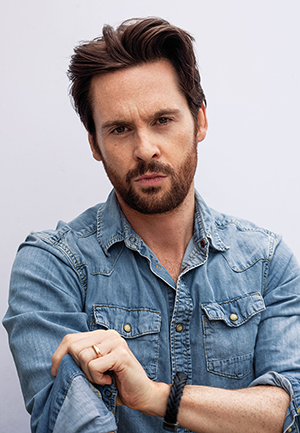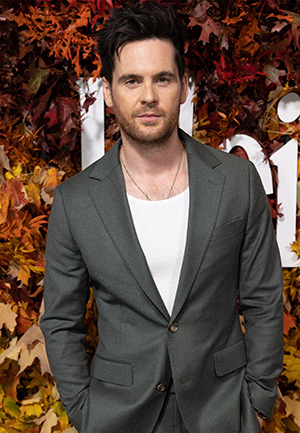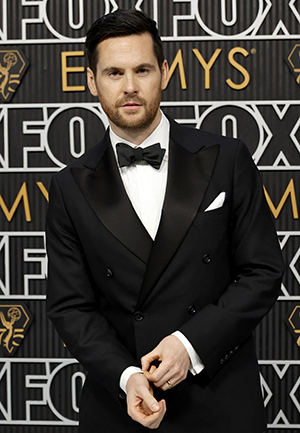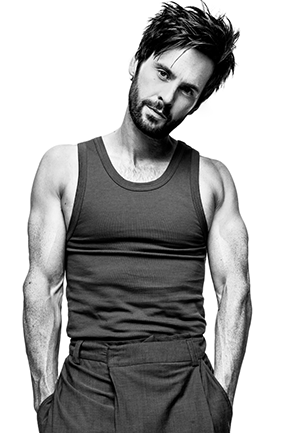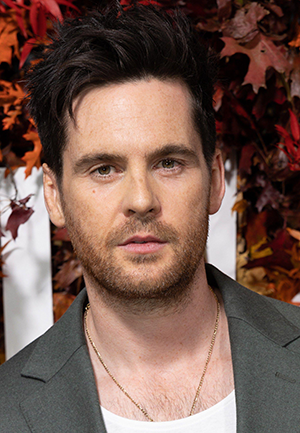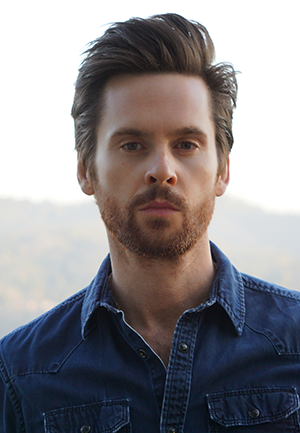Submitted by admin on 22/Mar/2014
Another great interview with Tom has been shared on Screen Crush. Some VERY interesting tit-bits have been revealed for season 2. Read it all on the site.
Coming back for a second season, is it easier?
Tom Riley: In theory, yeah, because I think we found our tone by the end of the first season. We found what worked best for the show and how to push it in the right way, so we knew what we were coming back to and the characters already had foundations so you could put them in different configurations and let them fly. But at the same time, because it’s so bold, the second season, because we decided to leave Italy and go crazy, that was different, that was hard.
You’ve done theater work, some Tom Stoppard, some David Hare…
Yeah, the greatest living playwrights. I only do sirs, I only do knights of the realm. [Laughs]
Good call. Would you compare a second season to month two of a play?
No. Because with a play by month two that’s where you’re going “ugh.” Unless it’s a Stoppard or indeed a Hare, where you’re learning stuff even though you’re doing the same thing. Coming back for a second season, it’s so different. You’re working with different people, sometimes the crews change, sometimes the storylines change, your locations change. With a play in the second month, you’re saying the same lines in the same room to the same people.
With Hare and Stoppard in month two, have you had moments where you think, “My perception of this character has completely changed”?
When I did ‘Arcadia’ on Broadway. With Stoppard ... I mean, I was learning things down to the last day, going, “Oh my god, it’s that, this is what makes it interesting.” But a play like that is rare. A play like that doesn’t come along very often. And that’s one where we had Tom in the room for the first two weeks telling us everything, explaining it to us, and we were still finding out new things to the end.
Was Stoppard an influence on your character? He is a genius, that one.
I would say no, because Tom doesn’t intimidate with his genius. You would never feel like the dumbest person in the room. He always puts you at ease and obviously he’s got a huge intellect, but he’s not someone you can’t be yourself around because you’re too worried he’ll call you out for not having a brain. Whereas Leonardo, that doesn't bother him so much.
I watched the first three episodes of the new season, and your impression of Riario is one of my favorite moments of the show. Was that something where the actor knew you were going to do it?
Oh, Blake [Ritson] knew.
Was he on set?
No. That would have been tough. Bless him. That was fun to do, but it took a lot of work. He does a very specific voice, so I had to get the take right and make sure it was the right version we used because occasionally it slipped. It’s hard to keep up that growly voice.
It seems like part of the fun of the character are the inventions. How much research do you do?
So much, for the first season in particular. I went to every exhibition that was around London and in New York when I was there. I read his journals and biographies about him -- both ones that were set in stone, others that were speculative. So I feel like I learned a great deal, but that was the stuff I didn’t know. I knew about his brush stroke ability because that’s what you’re taught in school. “He could draw with two hands.” But I wasn’t aware of his engineering or his deception work, or that he dug up corpses and filled them with wax and cut them in half and then would draw the insides. That’s not the guy who painted the most beautiful portrait with the Mona Lisa, that’s someone else.
So that informs your performance? There doesn’t seem to be a lot of on-screen portrayals of the character. Is there anyone you were thinking about?
It’s funny, when they were pitching the show it was with pop culture heroes, in that he’s like Tony Stark, or Indiana Jones, or Bruce Wayne, and they’re fun references, but by the second season it’s been nice to coalesce that into his own man and stop being the renaissance Sherlock.
Or the Renaissance MacGyver.
Exactly. There are so many cultural touchstones for it, but I think he’s become more of his own man in the second season.
There’s definitely an “origin story” aspect to the first season, but there’s also a couple episodes of the week, like with Dracula. This is more serialized. Could you feel that?
Oh yeah, and that’s when the show works. But even with the Vlad, with the Dracula episode, it was still driving the story. Certainly the nun episode, episode 3, that was more procedural, but that was a gimme when you’re trying to work out what the show is, when you’re trying to find out what hits and what misses. And that showed elements that were important in how Da Vinci treats his friends and how they think of him, but this season we’ve avoided those “stories of the week” more.
Do you think that’s the influence of HBO or British television, which often has more compact two-season-type runs?
But with British television, they’re only six episodes, so you can get away with doing an arc because you know people are watching and might not drift off in the middle. I don’t know if it’s an HBO influence in so much as the writers always wanted to write a long story, but people get nervous. Do we need to hook people in with this? And when you start to second guess, that’s when you mess things up. “I am going to make what I want to make, and hopefully people are into it.”
Also, with DVRing…
That’s completely changed the way, and I think the rest of the world is catching up with the Netflix model, though I don’t mean the “release them all at once and binge” model, but the whole “it’s available now to the world you don’t need to stream it, it’s there.” And we’ll judge the ratings on how many times it’s watched, that’s the way we’re heading, so hopefully they’ll catch up.
Are you a binge watcher?
I wouldn’t say so. I don’t do more than two. Having now played Leonardo for two years, I start feeling guilty when I’m not doing anything, when I’m not achieving anything, I get very restless. I can watch two, but I hate not having the next one available.
I find with ‘The Wire' or ‘Breaking Bad,’ it’s great to go back and go through it again to see that the pieces really do fit together and that’s one of the nice things that you’ve been doing that there’s a sense you’re continuing the story. How hard is it to jump back in?
As you know from the first episode, the season starts like a rocket, so it was tough because we felt like we were tying up all those loose ends at the first half of that episode, so we weren’t sure it would hold together structurally, but I think it does because of the strange little moment that opens the episode, the flash forward. But you’re right, even in season 1, which had a more procedural feel from time to time, it was still a puzzle. David is incredible at knowing to stick something in the back of a shot, and knowing someone will catch it, and you think, “You’re also writing 'Batman and Superman.' How are you doing all of this?”
The nice thing is the writers are the ones who have to think, “Oh, we’ll get a pig intestine and that will solve everything.”
I just have to act it. Occasionally, you’ll get something and think, “Hold on, this doesn’t work, does it?” and that’s when you’re in a panic on set when you realize on the page it was a great idea but it doesn’t work when they make it, and that happens sometimes. They write it in a room in LA, and we’re in Wales trying to realize it and it doesn’t quite click, and then you’re improvising, but that’s exciting.
How do you get in the inventor headspace, do you have a key?
The real key for me is that you learn the lines so hard that you can throw them away. Because the minute I’m trying to remember them is the minute I don’t feel like an inventor genius and start feeling like an actor trying to know what’s next. So knowing all the plots and being able to leap about, that’s the harness.
It sounds like a season shot like a big movie.
It is.
Does that help? Is it like an eight-week process for you?
Well, we take longer per episode than they do with a network show, it’s like four weeks an episode. It’s big, it’s big budget, it’s a gigantic studio space -- 260,000 square feet -- three sound stages going at once, it’s a big old enterprise. But really it’s the same as doing a Stoppard, or doing a short film as a favor between seasons, or doing a TV show or the second biggest TV show in the UK behind ‘Game of Thrones,’ it comes down to two people in a room talking while cameras are pointed at them. And all that other stuff is just lovely, it’s just set dressing.
When will you hear about season 3?
Hopefully when the second season comes out.
I remember you got picked up for the second pretty quickly.
We did. Starz has always been good -- they support the show, they keep pushing it, and these things grow. That’s how ‘Breaking Bad’ worked, people weren’t watching but then they got it. The shows get better, they improve and you have to invest, especially in a world we live in today where ratings don’t really reflect how people watch television. But it’s all they’ve got to jump on, they say, “The Nielsen ratings!” But you say, “But look at the catch up.” The ratings for the first season were huge, but if you looked at the Friday night airing, you’d think, “Oh no!” but by the end of the week it was huge.
That’s got to be stressful and then a relief. Four weeks an episode?
Three or four weeks, yeah.
So if you’re going to be on again in 2015…
We’re going to have to get working.
Have they talked about it?
Oh, David knows what’s happening in season 15. They’ve got a plan, they’ve got an overview, and if we are to go again, I think we’ll be able to go quite quickly.
So this is your main commitment? You’re locked in?
This is eight months of the year. But I’m about to do an indie movie, then I’m going to do something for two weeks that I can’t talk about but I’m so excited about my brain wants to pop, and that will just about fit until we go again.
It sounds like you can’t talk about that, so I won’t press, but do you like working in the off season?
Indeed I can’t, but I do like to do something different, because also between [seasons] 1 and 2 I couldn’t do anything because of the publicity. We went to Florence, because Fox picked it up internationally for 150 countries, so we had to start doing that. That was a big chunk of time.
What do you feel you’ve learned from the first season for the second season?
I feel like we learned what works and what didn’t. I had always planned to change Leonardo as we went on, that was always my thinking from the cocky young ingénue into the man we know today. I just hoped to build on what we’ve done before, and the stuff I didn’t like I hope to have excised.
